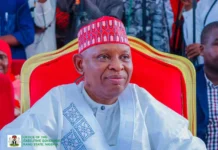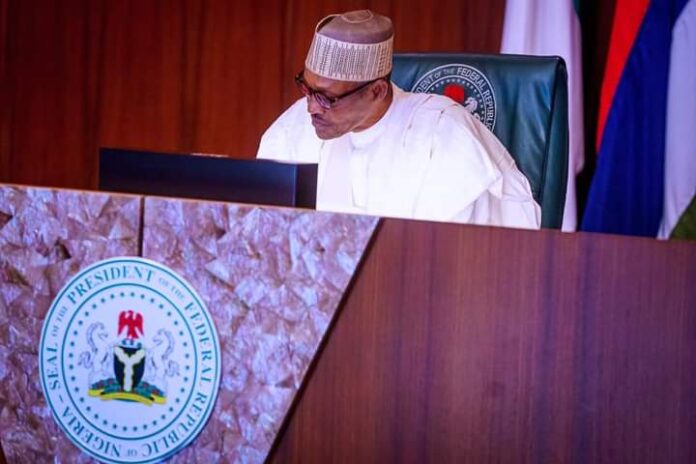
President Muhammadu Buhari Monday gave strong assurances that security would be restored to Borno State in the North-east and the nation at large, following the recent adoption of new strategies, and the acquisition of modern military equipment.
Speaking at the State House in Abuja during a meeting with the five North-east State Governors, Buhari said: “Things will improve very soon. We are acquiring modern equipment; some are here, some are being cleared, and others still coming. We need patience with acquisition of equipment. You need to train the trainers for their usage ahead of their deployment to the field.”
The meeting was attended by Vice President Yemi Osinbajo, the Chief of Defence Staff, Service Chiefs, the Inspector-General of Police and the heads of intelligence agencies.
Reacting to the governors who spoke through their Chairman, also Borno State Governor, Babagana Zulum, the President added: “I have listened to your presentation. I assure you, the North-East Governors, especially that of Borno, that we go to bed and wake up thinking about you, how to secure our country, that is the responsibility of every government.
“Our party campaigned in 2015 on three major objectives, among which is Security. We said the same thing in 2019 and Nigerians believed us. We are doing our best and we will continue to do even better.”
Buhari lamented the impact of the novel Coronavirus (COVID-19) pandemic on the economy, making scarce resources even scarcer, coupled with its severe impact on the supply chain of military equipment and spare parts.
“Our government is doing its best on the question of equipment and the military personnel know. We have equipment coming from some countries. The acquisition of military wares and spares is not easy, especially if you are not the manufacturer,” the President said, in a statement by his Senior Special Assistant on Media and Publicity, Garba Shehu.
The Secretary to the Government of the Federation (SGF), the Chief of Staff, the National Security Adviser and all the Service Chiefs, who spoke in support of the President, assured that things would get better soon.
They made a strong case for strengthening ties among the military, state governments, traditional institutions and all communities and the residents of the region.
The Chief of Army Staff, Lt. General Tukur Buratai, gave an assessment of the current efforts, noting that Boko Haram terrorists have been flushed out of all the states in the region, leaving Borno State as the last stop.
He said: “There are no Boko Haram terrorists in neighbouring states. They have been pushed out, and now cornered in Borno State. We are coordinating with civil and traditional authorities, mobilising and reinforcing and all we need is patience. We will not relent.”
On his part, the Chief of Air Staff, Air Marshal Sadique Abubakar, briefed the meeting on the acquisition of military aircraft, explaining that the imminent arrival of Unmanned Aerial Vehicles, UAVs, known as drones with more than 10 hours of flying time, would strongly reinforce the battle front.
Briefs were also received on equipment needs of the police as well as the changing alliances between criminal gangs and terrorist groups in the region from the intelligence community.
In their address at the beginning of the meeting, the North-East Governors noted that the security situation in the region has now greatly improved, compared to the time the President assumed office.
While commending Buhari for the establishment of the North-East Development Commission and the take-off of Mambila Dam Power Project, they however, called for attention to the condition of most of their roads.
They also warned of the consequences of a “war economy” and the need to address the root causes of the insurgency.
The governors said: “A large population in the region, especially in Borno State, have no access to their homes and farmlands,” while calling for efforts to curtail the “increasing trust deficit between the population and the armed forces.”
Photos:
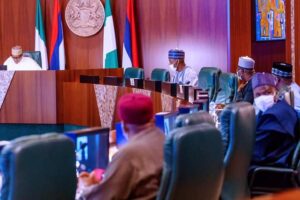
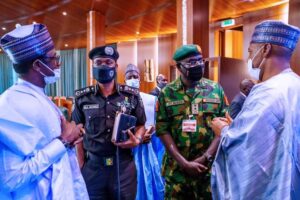
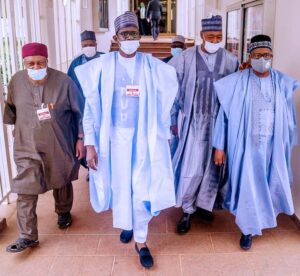
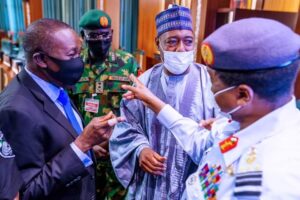
Idowu Sowunmi



